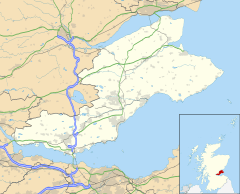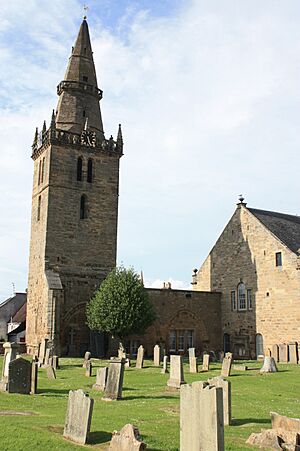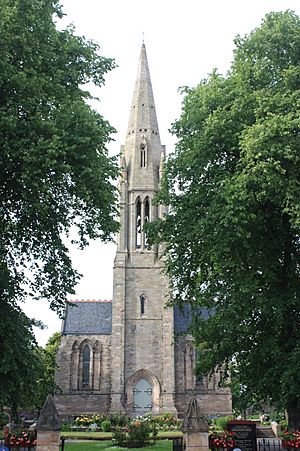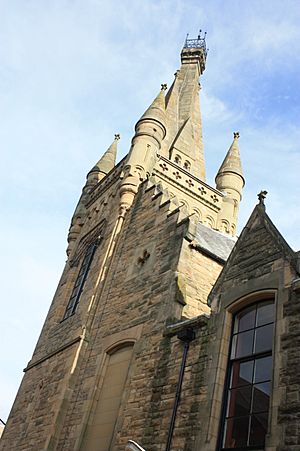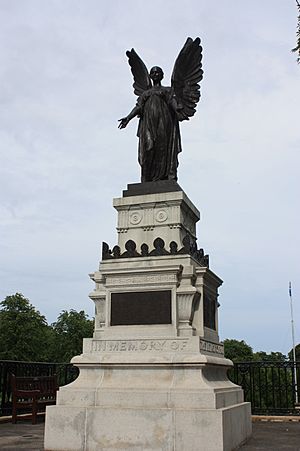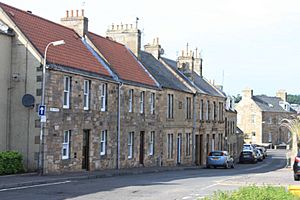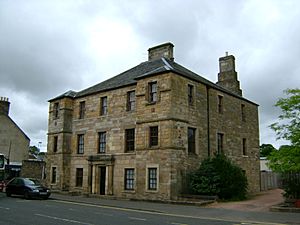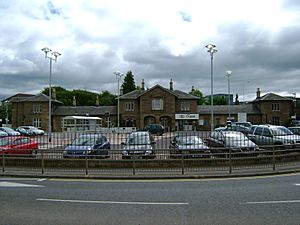Cupar facts for kids
Quick facts for kids Cupar
|
|
|---|---|
 Cupar seen from the summit of nearby Tarvit Hill |
|
| Population | 8,960 (2020) |
| OS grid reference | NO374146 |
| • Edinburgh | 26 miles (42 km) SSW |
| • London | 352 miles (566 km) SSE |
| Council area | |
| Lieutenancy area | |
| Country | Scotland |
| Sovereign state | United Kingdom |
| Post town | CUPAR |
| Postcode district | KY15 |
| Dialling code | 01334 |
| Police | Fife |
| Fire | Fife |
| Ambulance | Scottish |
| EU Parliament | Scotland |
| UK Parliament |
|
| Scottish Parliament | |
Cupar (pronounced KOO-per) is a historic town in Fife, Scotland. It's located between the cities of Dundee and Glenrothes.
Cupar used to be a "royal burgh," which means it was a special town with rights granted by the King or Queen a long time ago. It was also the main town, or "county town," for Fife for many years. Today, about 9,000 people live in Cupar.
Contents
Discovering Cupar's Past
Cupar likely started as a small settlement around Cupar Castle. This castle was an important place where the local sheriff, a kind of judge, worked. The Earls of Fife owned the castle.
Over time, Cupar became a central place for legal matters and a busy market town. Farmers would bring their cattle and sheep here to sell.
Early Assemblies and Royal Status
In the late 1200s, Cupar hosted an important meeting. King Alexander III gathered leaders from the church, noble families, and townspeople in 1276. This meeting was an early version of what would later become the Parliament of Scotland.
Although some old documents were lost, it's believed Cupar became a royal burgh sometime between 1294 and 1328. This special status helped the town grow.
The oldest record mentioning Cupar as a royal burgh is from 1381. King Robert II gave Cupar the right to have a port at Guardbridge on the River Eden. This helped Cupar trade more easily with places like Flanders (modern-day Belgium and Netherlands).
How Cupar is Governed
Cupar has different levels of government that help run the town and surrounding areas.
Local Government in Cupar
The lowest level is the Cupar Community Council. Their job is to share what local people think with the bigger governments.
Fife Council is the main local government for Cupar. They are based in Glenrothes and make decisions about things like schools, roads, and local services. Cupar is part of three areas that elect eleven councillors to Fife Council.
The County Buildings on Catherine Street are important offices for Fife Council in eastern Fife. They handle things like planning and farming issues.
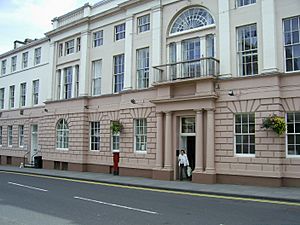
National and UK Parliaments
Cupar is part of the North East Fife area for the Scottish Parliament. This parliament makes laws for Scotland on topics like education and health.
For the UK Parliament in London, Cupar is in the North East Fife area. This parliament handles bigger issues for the whole United Kingdom. Currently, Wendy Chamberlain is the Member of Parliament (MP) for this area.
Who Lives in Cupar?
In 2001, Cupar had a population of 8,506 people. By 2008, this had grown to about 8,980.
The people living in Cupar are similar to the rest of Scotland. The largest group of people are aged between 30 and 44. The average age for men is 39, and for women, it's 43.
Most people in Cupar (about 95.81%) were born in the United Kingdom, with a large number (81.64%) born in Scotland itself. Only a small percentage were born outside the UK.
Many adults in Cupar are employed full-time (42.20%) or part-time (12.32%). Some are self-employed (5.89%).
Exploring Cupar's Landmarks
Cupar has many interesting old buildings and landmarks that tell its story.
Historic Town Centre
The heart of Cupar is where Bonnygate and Crossgate streets meet. Here you'll find the town's mercat cross, a historic market cross from 1683. It has a unicorn on top!
Nearby on St Catherine Street are the burgh chambers and county buildings. These were designed by Robert Hutchison in the early 1800s. The burgh chambers have a cool curved corner. The county buildings look like some of the grand buildings in Edinburgh's New Town.
You can also spot the tall tower of the Corn Exchange from many parts of the town.
Memorials and Old Buildings
At the east end of St Catherine Street is the Cupar War Memorial. It's built in a classical Greek style and honors those who fought in wars. Field Marshal Earl Haig first unveiled it in 1922.
The Old Gaol, a former prison built in 1813–14, is also on Coal Road. It's a classical-style building that has had many uses over the years.
Unique Architecture
On Bonnygate, you'll find Preston Lodge, the town's second oldest building, dating back to 1623. It's a beautiful old house that was expanded and remodeled over the centuries. Its design might have been inspired by Culross Palace.
At the corner of Crossgate is the Duncan's Institute. Built in 1870–71, it was created as a place for the "working classes of Cupar" to learn. This building is famous for its unique twisted spire, which mixes Gothic, Scottish, and Flemish styles.
The Parish Church of Cupar Old and St Michael of Tarvit is on Kirkgate. Its tower is very old, from 1415, and is the only part left of the original church. The main church building was added in 1745.
Beyond the Town Centre
To the south of Cupar, you can visit the Hill of Tarvit mansion house. This grand house was rebuilt around 1907–1908 to hold a large collection of French art and antique furniture. It shows what life was like for a wealthy family before the First World War.
Nearby is Scotstarvit Tower, a well-preserved tower house from the early 1600s. It's a simple, five-story building with a unique L-shape.
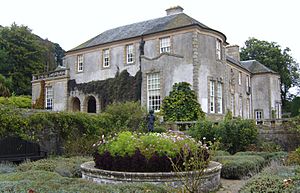
Cupar's Economy
Fife Council is the biggest employer in Cupar. Many people also work in the food and drink industry.
Some of the larger companies in the area include Kettle Produce, which grows fruits and vegetables, and Fishers Services Ltd. Other important employers are the SRUC Campus at Elmwood College (for education) and food companies like Quaker Oats Ltd and Fisher & Donaldson.
The main shopping areas are along Bonnygate and Crossgate. You'll find local family-owned shops and some smaller chain stores there. Cupar also has a Business Park, Trading Estate, and Industrial Estate for different businesses.
Cupar Retail Park
A new retail park on South Road was finished in November 2021. It has popular shops and restaurants like Burger King, Costa Coffee, B&M, and Card Factory.
Fun Things to Do in Cupar
Cupar offers several activities for leisure and sports.
Golf and Sports
Cupar has a unique golf course on the side of a hill at Hill of Tarvit. The Cupar Golf Club was founded way back in 1855 and is thought to be the oldest nine-hole golf club in the world!
At the Kingarrock course at Hill Tarvit Mansion, you can even try playing golf with old-fashioned hickory shafted clubs.
The Cupar Sports Centre has a 25-meter swimming pool, badminton courts, squash courts, and a fitness room. It's home to the Cupar and District Swimming Club. Cupar also has a Cricket Club, which started in 1884.
Community and Arts
The Castlehill Community Association is a hub for local groups like the Cupar Camera Club and Cupar Art Club. They meet at the Old Castlehill Primary School.
Every two years, Cupar hosts the Cupar Arts Festival, which celebrates local art and creativity.
Learning in Cupar
Cupar has several schools for different age groups, from nursery to college.
Primary and Special Needs Schools
Westfield Family Nurture Centre is Cupar's only nursery school.
Castlehill Primary School opened in 1975 and has about 420 students. St Columba's R C Primary School opened in 2006 and serves the Catholic community, but also welcomes other students.
Kilmaron School is a special school for students aged 3–18 who need extra support. It was built in 1964.
Secondary School and College
Bell Baxter High School is the main secondary school for Cupar and the nearby villages. It moved to its current location on Carslogie Road in stages, completing the move in 2010. In 2009, it had about 1620 students.
SRUC Elmwood (formerly Elmwood College) has campuses in and around Cupar. It's known for its excellent golf-related studies and education in land-based subjects.
Getting Around Cupar
Cupar is well-connected by bus and train.
Bus and Train Services
An express bus service runs every hour, connecting Cupar to Edinburgh and St Andrews, and also to Glasgow and St Andrews. Other bus services connect Cupar to nearby villages and towns like Kirkcaldy and Dundee.
Cupar has its own railway station south-east of the town centre. It's on the East Coast Main Line, with regular trains to Edinburgh Waverley and Aberdeen. Nearby train stations include Leuchars to the north and Springfield and Ladybank to the south.
Air and Sea Travel
The closest major international airport is Edinburgh Airport. The nearest ferry port is at Rosyth.
Military Presence
Cupar has a military presence with Yeomanry House, a drill hall built in 1890. This is home to 'C Squadron' of the Scottish and North Irish Yeomanry. This group provides light cavalry support and has trained in places like Germany and the United States. They have also been part of operations in Afghanistan, Iraq, and Cyprus.
The Army Cadet Force and Air Training Corps (571 Cupar Squadron) are also active in the town, offering training and activities for young people interested in the military.
Famous People from Cupar
Many notable individuals have connections to Cupar:
- Adam Cairns (1802–1881) – A Presbyterian minister who moved to Melbourne.
- John Finlayson (disciple) (1770–1854) – A religious leader.
- John Laird (1811–1896) – A Presbyterian minister.
- Colonel Robert Hope Moncrieff Aitken (1826–1887) – A soldier who received the Victoria Cross for bravery.
- Henrietta Keddie (1827–1914) – A writer known as Sarah Tytler.
- Sir Thomas Russell, 1st Baronet (1841–1920) – A politician and campaigner.
- Lady Henrietta Gilmour (1852–1926) – A pioneering photographer.
- Robert Robertson (1869–1949) – A chemist and former government chemist.
- Jane Stocks Greig (1872–1939) – A physician and public health expert.
- Alexander Nimmo (1783–1832) – A civil engineer and geologist.
- Rab Noakes (1947–2022) – A singer-songwriter.
- Rory Douglas-Speed (born 1992) – An actor.
- Caroline Baird (born 1973) – A Paralympic athlete.

See also
In Spanish: Cupar para niños


